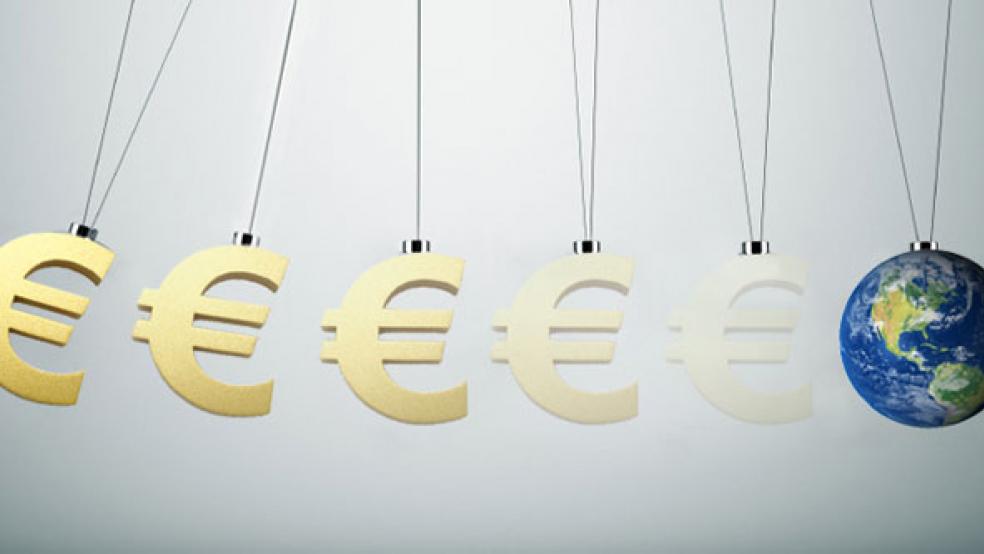Italy managed to hold a successful bond auction Thursday, which for the moment calmed market fears about the eurozone’s imminent collapse. But the success of the auction does little to solve Europe’s financial woes, and is unlikely to be remembered as Italy pushes the continent ever closer to the brink of economic failure.
It is now a real possibility that debt-ridden and fiscally irresponsible countries like Greece and Italy could be unceremoniously kicked out of the eurozone to try to salvage the alliance. According to reports, French and German leaders have begun discussions about breaking up the eurozone. Meanwhile, Great Britain – which isn’t even part of the alliance, but whose economic success is tied to the euro – is complaining that countries like Italy are weighing down growth across the continent.
The eurozone was first forged in 1998 after most European countries adopted the euro as their common currency. Monetary policy of the zone is controlled by the European Central Bank, whose principal task initially was to keep inflation under control. But in the wake of the mounting debt crisises of Greece, Italy, Spain and others, the bank and European leaders have mounted repeated – and largely unsuccessful – efforts to avert defaults that could send the continent and the global economy reeling.
Now, a scenario that was dismissed repeatedly by European leaders since the crisis began nearly two years ago is possible: the euro as we know it could disappear. Italy would be forced to return to the lira and Greece to the drachma. If Portugal and Ireland’s finances don’t improve, they could be forced out of the eurozone as well.
In this scenario, the euro would live on as a currency in Germany, France and other wealthier and more industrialized northern European countries. This alliance would require increased integration of fiscal policies to prevent future crises and strict budget and debt conditions.
In effect, this would create an alliance of powerful northern European economies, bordered by countries whose currency holds little value. Income inequality would inevitably follow. Inflation would be a nearly impossible event. The continent would be separated into a collection of economic winners and losers.
There are few in Europe who actually want this to happen, but an Italian default would be catastrophic. Italy is the eurozone’s third largest economy. If it collapses it would take much of the euro zone with it and signal the failure of the European experiment. But breaking up the eurozone might be the last best option for Germany and France’s self-preservation.
“They couldn’t put a firewall around Greece,” said Erik Jones, professor of European studies at the Johns Hopkins University SAIS Bologna Center, referring to Europe’s inability to corral the Greek debt crisis. “How are they going to contain Italy? They can’t.”
The Italian bond market is enormous. Italy carries $2.6 trillion dollars in debt, the third largest market after the United States and Japan. But Italian gross domestic product is only $2 trillion, compared with a GDP of $15 trillion in the United States and $5.4 trillion in Japan. Italy can’t continue to service this debt without assistance, and the European Union doesn’t have the money or political will to bail out Italy.
At the same time, prospects for economic growth in Italy are remote. Nearly 9 percent of Italians are unemployed, but many have simply stopped searching for work. The Italian economy has grown only 2.5 percent over the last decade. Exports and manufacturing, the drivers of economic growth in the 20th century, are down drastically in the last 10 years.
Compounding these problems are systemic political ones. Silvio Berlusconi, who remained Italy’s prime minister despite endless sex scandals and legal troubles, made a farce of Italian politics. He’s now set to be replaced by a gaggle of technocrats led by former European Commissioner Mario Monti. Whether the new government can pass necessary austerity measures remains to be seen.
German Chancellor Angela Merkel said Wednesday that the crisis presented a chance to reinvest in the European Union, just before the news leaked that Germany and France were considering breaking up the eurozone.
“The debt crisis is not just something unpleasant, it is a turning point, an opportunity to create something new,” Merkel said. “Good intentions are not enough.”
According to Jones, these comments reflect the growing belief that the only way to solve the crisis is greater integration, along with a new set of rules set by Germany.
“They’re trying to play the game where only the really good countries – meaning Germany - make decisions,” Jones said.
But Jones warned that Merkel should be cautious in asserting German dominance. Ultimately, debt-ridden countries like Italy and Greece are in a position of power.
“If they kick Italy out, what is the possibility that Italy will pay back all the money they owe in euros?” Jones said. “The French and Germans can kick and scream all they want but it’s not a real possibility.”
“If you borrow a thousand dollars from the bank, the bank owns you. If you borrow a billion dollars from the bank, you own the bank,” he added. “Italy now owns the bank.”





